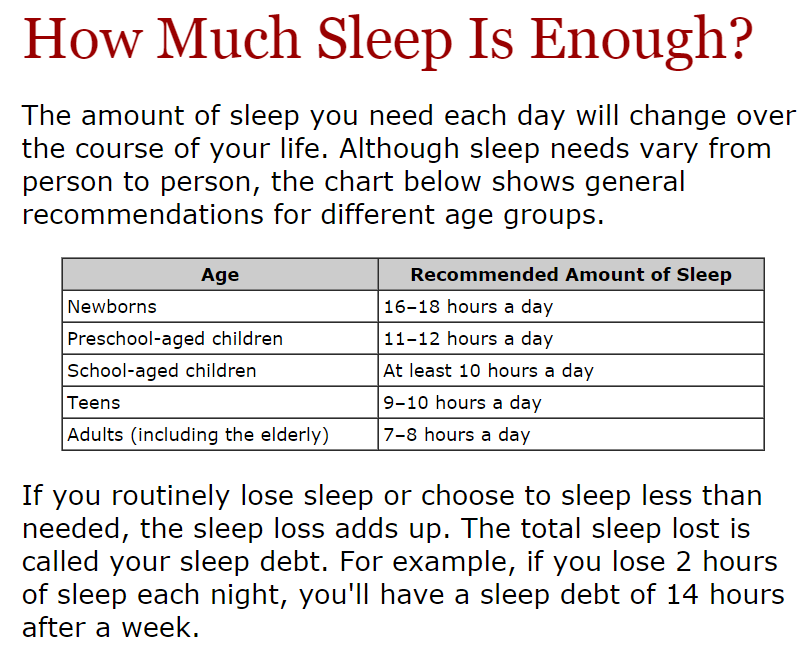Why Is Adequate Sleep Important?
While I was growing up, there was one rule that could not be broken at home. That was bedtime. Even when my parents were working late, my grandmother who would be visiting from Paete, Laguna and babysitting us, would make sure that I was in bed at the right time. There were no excuses, even celebrating New Year's Eve or having guests in the house would not be acceptable. My parents knew without being aware of medical and educational research that sleep was very important. My father easily associated the mood and functioning of a child with the amount of sleep a child got during the previous night. I am indeed very fortunate that my parents had the wisdom of recognizing that sleep deprivation might lead to all sorts of problems like drug abuse, compromised physical health, and poor academic performance.
For children and adolescents, sleep is so much more than just resting. It may have been a superstitious belief on my mother's part that using a book as a pillow can help me learn things since information can not really diffuse through my scalp but during sleep. Nonetheless, the brain of a child is really at work. It is the time of the day when the brain is preparing itself. It is during sleep that the brain forms new pathways to help one learn and remember information. It is no surprise then that children and adolescents require more sleep as their brains are still rapidly developing. Here is a screen capture of page from the United States National Institutes of Health:
Sleep deprivation has serious consequences on a child's growth and development. In Seminars in Neurology, Durmer and Dinges enumerated effects of not sleeping enough on our cognitive performance:
Lack of sleep is likewise implicated in deterioration of executive control. An article in 2013 published in Behavioral Sleep Medicine examined past studies and concluded that sleep deprivation is correlated with an increase in risk taking behavior:
One study even suggests that providing the youth adequate sleep may in fact solve substance abuse problems:
The physical effects of sleep deprivation are likewise well known. For instance, the following study shows that sleep deprivation is associated with more frequent occurrences of illness:
Lastly, sleep deprivation also affects academic performance, as summarized on the meta-analytic review shown below:
Sleep hygiene is a very simple intervention and yet it may be able to address so many problems society is facing with regard to its youth. It is also much cheaper than other measures. All it requires is good parenting and a responsible community....
P.S. After posting the above article, I received this link from Maggie Danhakl • Assistant Marketing Manager, Healthline • The Power of Intelligent Health which shows the following image describing the effects of sleep deprivation:
For children and adolescents, sleep is so much more than just resting. It may have been a superstitious belief on my mother's part that using a book as a pillow can help me learn things since information can not really diffuse through my scalp but during sleep. Nonetheless, the brain of a child is really at work. It is the time of the day when the brain is preparing itself. It is during sleep that the brain forms new pathways to help one learn and remember information. It is no surprise then that children and adolescents require more sleep as their brains are still rapidly developing. Here is a screen capture of page from the United States National Institutes of Health:
Sleep deprivation has serious consequences on a child's growth and development. In Seminars in Neurology, Durmer and Dinges enumerated effects of not sleeping enough on our cognitive performance:
Lack of sleep is likewise implicated in deterioration of executive control. An article in 2013 published in Behavioral Sleep Medicine examined past studies and concluded that sleep deprivation is correlated with an increase in risk taking behavior:
One study even suggests that providing the youth adequate sleep may in fact solve substance abuse problems:
The physical effects of sleep deprivation are likewise well known. For instance, the following study shows that sleep deprivation is associated with more frequent occurrences of illness:
Lastly, sleep deprivation also affects academic performance, as summarized on the meta-analytic review shown below:
Sleep hygiene is a very simple intervention and yet it may be able to address so many problems society is facing with regard to its youth. It is also much cheaper than other measures. All it requires is good parenting and a responsible community....
P.S. After posting the above article, I received this link from Maggie Danhakl • Assistant Marketing Manager, Healthline • The Power of Intelligent Health which shows the following image describing the effects of sleep deprivation:







Comments
Post a Comment